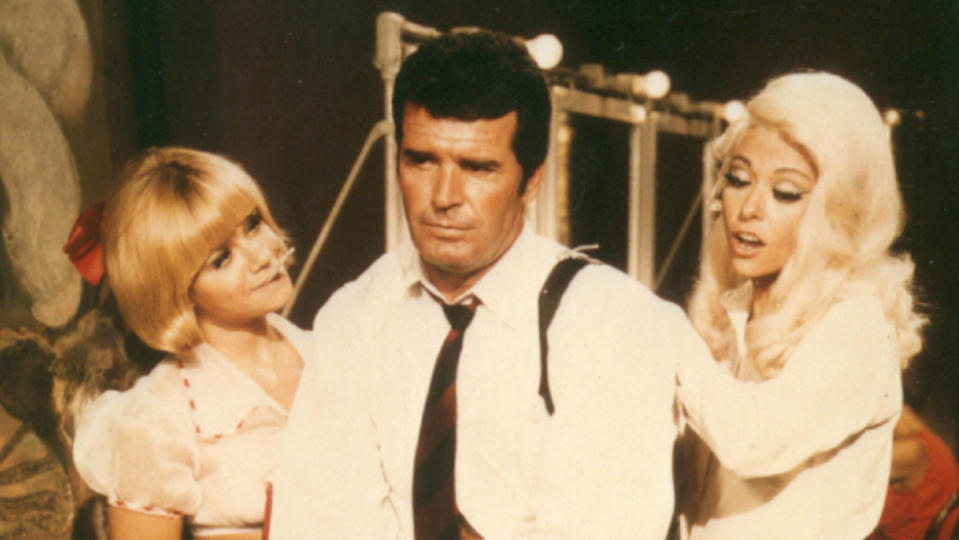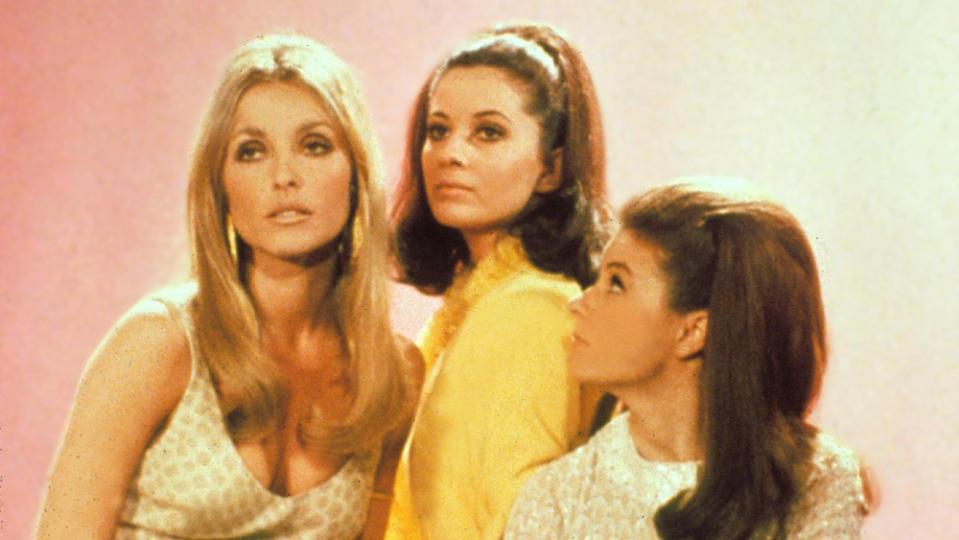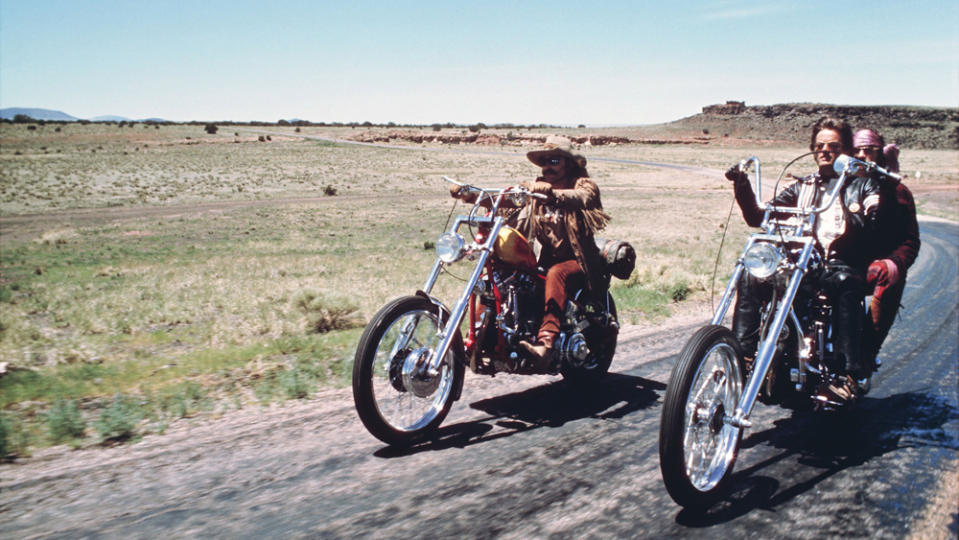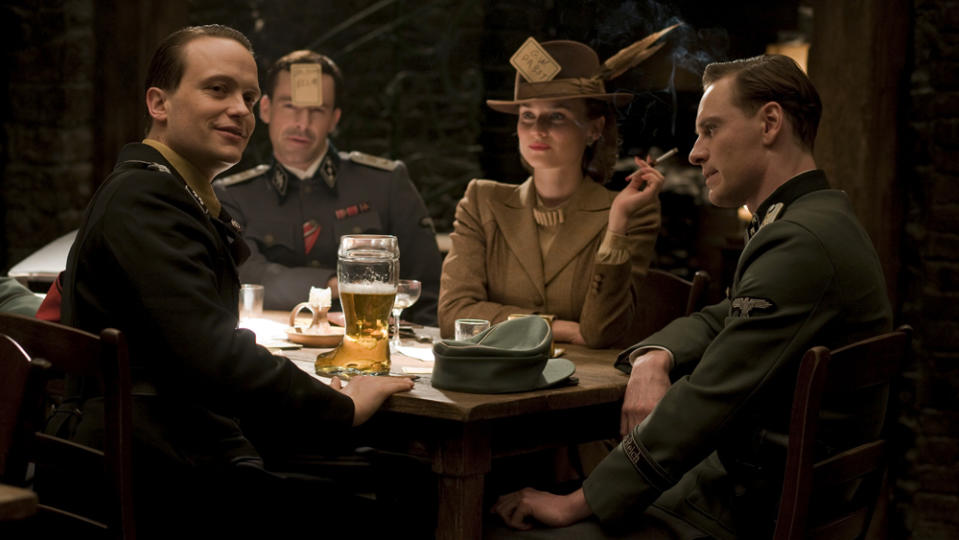Watch These 10 Films to Fully Appreciate ‘Once Upon a Time in Hollywood’

Click here to read the full article.
To fully appreciate some of the allusions and inspirations that propel Quentin Tarantino’s “Once Upon a Time in Hollywood,” you should consider doing some homework — or streaming some other movies.
Of course, you don’t have to be familiar with any of the following titles to enjoy Tarantino’s 1969-set fact-and-fiction mashup about Rick Dalton (Leonardo DiCaprio), an actor flailing in professional limbo after the cancellation of his TV Western “Bounty Law”; Cliff Booth (Brad Pitt), Dalton’s long-time stunt double and close confidant; and Sharon Tate (Margot Robbie), a rising star and Dalton’s next-door neighbor. But you can enhance your enjoyment by having some knowledge of the stories behind the story.
More from Variety
Once Upon a Time on KHJ: Quentin Tarantino's Music Supervisor on QT as AM DJ
'Once Upon a Time in Hollywood' Launches With $5.8 Million on Thursday Night
'Once Upon a Time in Hollywood' Actress Julia Butters on Working With Leonardo DiCaprio, Brad Pitt

“The Bandit” (2016)
Jesse Moss’ entertaining and insightful documentary is putatively about the making of 1977’s “Smokey and the Bandit,” but more interestingly concerned with the personal and professional bonds between superstar Burt Reynolds and stuntman-turned-filmmaker Hal Needham. While remaining mostly upbeat and respectful, Moss none-too-subtly indicates that the decades-long friendship shared by the two men — obviously an inspiration for the Rick Dalton/Cliff Booth relationship in “Hollywood” — was not entirely devoid of jealousy and resentment. Indeed, “The Bandit” emphasizes that Needham never managed to emerge beyond Reynolds’ formidable shadow — even though, unlike Brad Pitt’s easygoing Booth, he yearned for what he thought was his fair share of the spotlight.

“Model Shop” (1969)
Jacques Demy’s deliberately paced drama about an aimless young man (Gary Lockwood) who roams around L.A. while pondering his uncertain future and his recent draft notice is one of those ’60s cult favorites that, to be brutally honest, are much better remembered than revisited. But Tarantino himself has credited the movie as a “Hollywood” influence because of his vivid evocation of a specific time, place and zeitgeist — a quality director Andrew Slater exploits in the “Model Shop” excerpts he uses in his recent documentary “Echo in the Canyon.”

“The Wrecking Crew” (1969)
Starring Dean Martin as swinging super-spy Matt Helm — a character portrayed as a deadly serious assassin in the Donald Hamilton novels that “inspired” the movies — cues a surprisingly affecting “Hollywood” sequence in which Margot Robbie’s Sharon Tate surreptitiously visits a Westwood theater to view herself on screen, and is pleased to see the audience responding favorably to her spirited portrayal of Helm’s sometimes klutzy, sometimes agile assistant. It’s all the more affecting if you know that, in real life, the franchise-killing “Wrecking Crew” was the last film featuring Tate to be released during her lifetime.

“Marlowe” (1969)
Fans and admirers of the late Bruce Lee likely will be affronted by the scene in “Hollywood” where the legendary martial artist (played by Mike Moh) gets tossed about by stunt double Cliff Booth. The dust-up recalls a similarly improbable face-off in Paul Bogart’s “Marlowe,” a contemporized adaptation of Raymond Chandler’s “The Little Sister” that had James Garner’s private eye Philip Marlowe getting the best of a swift-kicking mob enforcer played by the real Bruce Lee after maneuvering said enforcer into diving off a rooftop. Years later, Garner would recall in his memoir: “I got to beat up Bruce Lee. (Only in the movies!)” As a bonus, Garner added: “Bruce showed me some martial arts moves between takes,” just like he does for Sharon Tate (prior to her “Wrecking Crew” role) in “Hollywood.”

“Any Gun Can Play” (1967)
Much like Rick Dalton, “77 Sunset Strip” heartthrob Edd Byrnes attempted to jump-start his stalled career years after his TV series was canceled by starring in three ‘60s spaghetti Westerns filmed more or less back-to-back in Italy. Unfortunately, unlike Dalton, he never worked with cult-fave filmmaker Sergio Corbucci (who directed “Navajo Joe,” a 1966 oater starring TV vet Burt Reynolds, and 1968’s “The Mercenary,” which is pointedly represented with posters in the theater Margot Robbie’s Sharon Tate visits during “Hollywood”). Even more unfortunately, none of Byrne’s spaghetti Westerns did much to reignite his faded star power (although he reportedly walked away with respectable paychecks). “Any Gun Can Play,” arguably the best of the lot, was directed by Enzo G. Castellai (who, not incidentally, later went on to direct 1978’s “The Inglorious Bastards”), and at least gives Byrne (cast as a bank agent who may or may not be involved with train robbers) the opportunity to shine in a couple of acrobatic fight scenes that look like early rough drafts for Jackie Chan extravaganzas. (By the way, Byrne played a character named Chattanooga Jim in Nando Cicero’s “Professionals for a Massacre.” In “Hollywood,” Rick Dalton stars in “Nebraska Jim.”)

“Fort Dobbs” (1958)
Rick Dalton talks about having wanted to break free of his “Bounty Law” TV series to focus his attention on a movie career. His situation recalls that of real-life TV Western star Clint Walker, who actually did star in three big-screen oaters directed by Gordon Douglas during breaks from his popular “Cheyenne” series. Trouble is, “Fort Dobbs,” the first of the three, was underrated by critics and mostly ignored by ticketbuyers. (The other two — 1959’s “Yellowstone Kelly,” co-starring “77 Sunset Strip” heartthrob Edd Byrnes, and 1961’s “Gold of the Seven Saints,” featuring “Maverick” co-star and future 007 Roger Moore — didn’t fare much better.) It’s interesting to speculate whether, after the events depicted in “Hollywood,” Dalton might have followed a career trajectory similar to that of Walker, who continued to attract a loyal fan base until his death last year, and made a number of TV-movie Westerns throughout the 1970s. Chief among the latter was 1972’s “The Bounty Man.”

“Valley of the Dolls” (1967)
Margot Robbie’s Sharon Tate finagles a free entry into the Westwood theater where “The Wrecking Crew” is playing only after she’s recognized as a star of “Valley of the Dolls,” the glossy 1967 soap opera based on Jacqueline Susann’s salacious best-seller. The movie, a box-office smash in its time, is now regarded primarily as a campy curio. But Tate’s career-highpoint performance as the ill-starred Jennifer North — a budding actress who winds up starring in wink-wink, nudge-nudge European “art films” before choosing suicide over a mastectomy — earned her a well-deserved Golden Globe nomination as Most Promising Newcomer, and holds up as a melancholy reminder of a painful truism: Few things in life are more tragic than a promise forever unfulfilled.

“The Great Escape” (1963)
Rick Dalton ruefully recalls he once had a chance — a very slight chance, he admits, but a chance nonetheless — to land the role Steve McQueen played to image-defining perfection in John Sturges’ “The Great Escape.” (Fun fact: According to “Escape Artist,” Glenn Lovell’s well-researched biography of Sturges, McQueen really did come close to being bounced from that classic action movie.) This cues a fantasy sequence where Dalton acts in a scene from “Great Escape” — and, intentionally or otherwise, DiCaprio and Tarantino make it very clear that Dalton simply lacked sufficient star power to ever sell the character they way McQueen did. McQueen himself, played by Damian Lewis, briefly figures into the sprawling “Hollywood” narrative. But no one mentions that he first attracted attention by playing another TV Western bounty hunter in “Wanted: Dead or Alive.”

“Easy Rider” (1969)
Dennis Hopper’s groundbreaking indie road movie, originally read (or, depending on your viewpoint, misread) by many as a sympathetic view of free-spirited hippie types crushed by The Man, opened in U.S. theaters just three weeks before the fateful evening of Aug. 8, 1969, and almost immediately signaled the start of the New Hollywood Era. Just as important, the hit film also indicated that long-haired rebels like Hopper and Peter Fonda might represent the next wave of Hollywood leading men. Which helps explain why Rick Dalton, basically an Old Hollywood type at heart, intends it as an insult when he addresses the scruffy-looking Tex Watson (Austin Butler) as “Dennis Hopper” when he spots Tex and other Charles Manson followers in his driveway. He probably wasn’t thinking of Dennis Hopper as he had appeared opposite John Wayne in “True Grit” (which had opened two months earlier).

“Inglourious Basterds” (2009)
Quentin Tarantino has repeatedly implored audiences not to reveal any plot twists in “Once Upon a Time in Hollywood.” But he kinda-sorta gives his own game away early on with a clip from the fictional “14 Fists of McCluskey,” a WWII action-adventure that has Rick Dalton raining fire — with a flamethrower! — on a roomful of Nazis. The image only serves to remind viewers of the crowd-pleasing climax Tarantino provided for his own “Inglourious Basterds” — which is turn doubtless will remind viewers that Tarantino has as much regard for historical facts as the makers of many spaghetti Westerns displayed for copyright laws when they churned out so many unauthorized “sequels” with Django, Sartana, Ringo, etc.
Sign up for Variety’s Newsletter. For the latest news, follow us on Facebook, Twitter, and Instagram.

